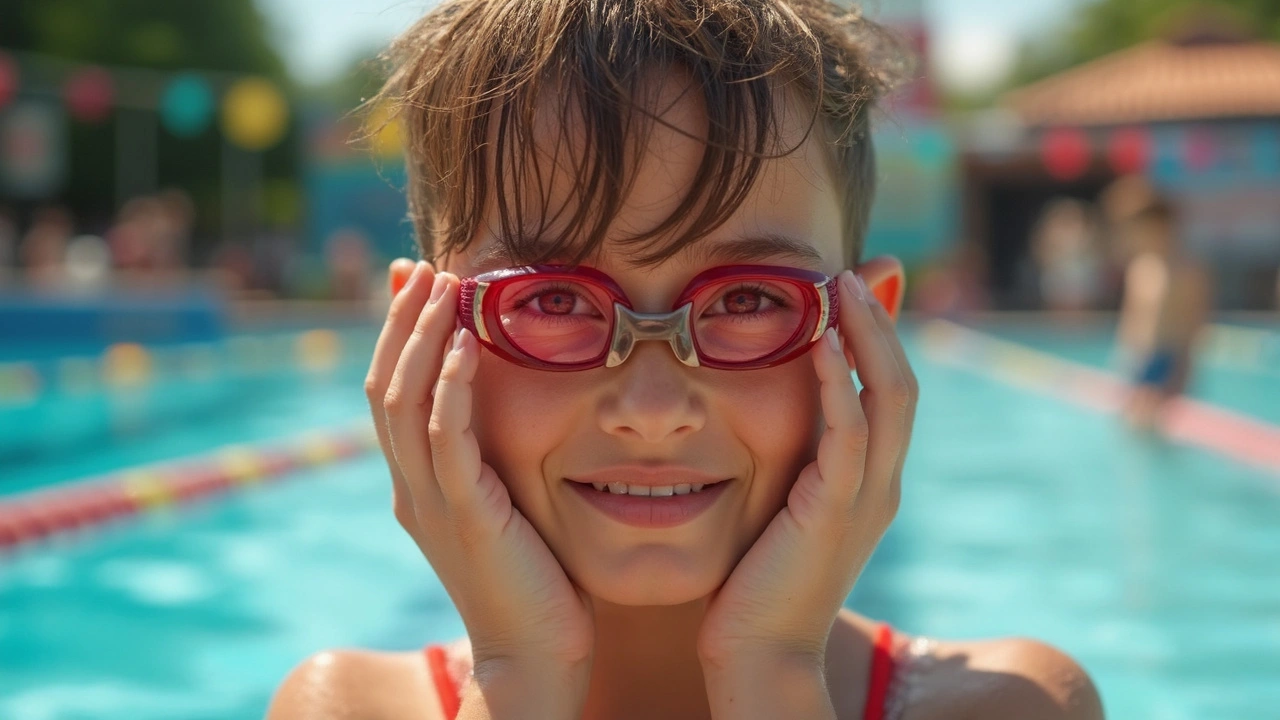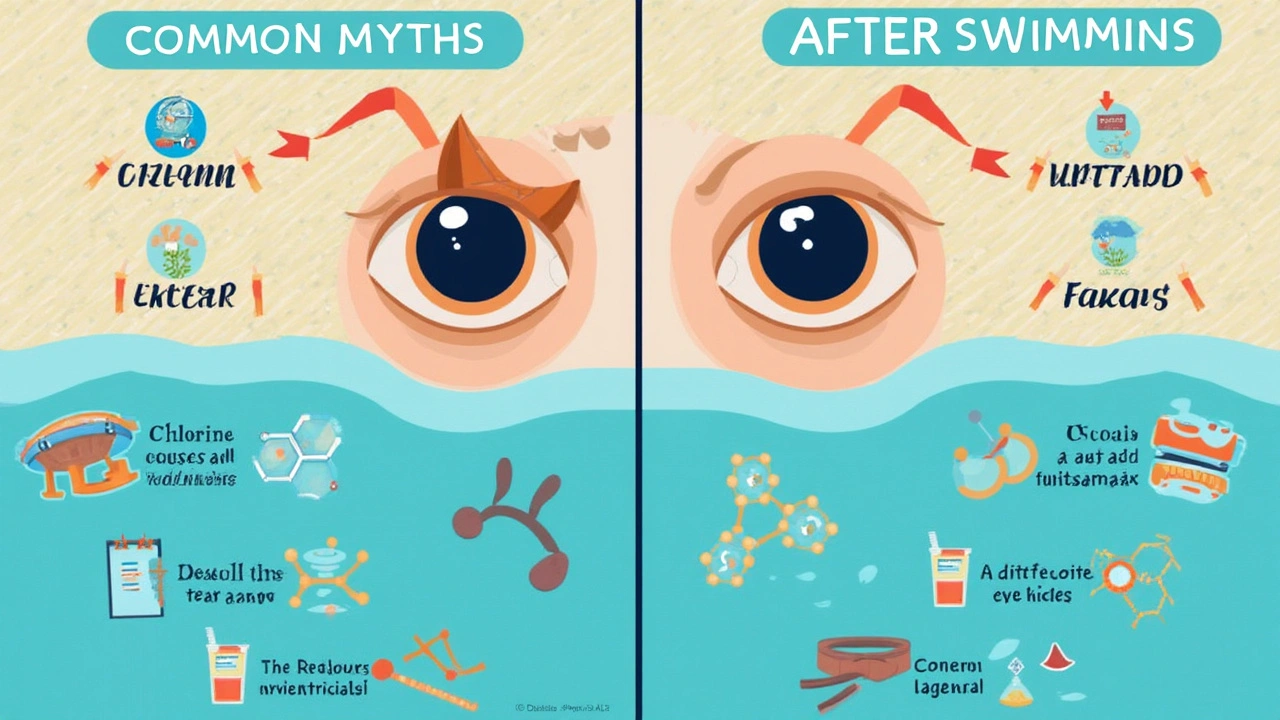How to Quickly Reduce Eye Redness After Swimming: Proven Tips & Relief Methods
 May, 9 2025
May, 9 2025
Ever stumbled out of a pool and caught yourself in the mirror, looking like you've pulled an all-nighter? You’re definitely not alone. Red, stinging eyes after swimming are almost a badge of honor among regular swimmers, but do we really know why this happens or how to make it better—fast? The weird part is, even pristine-looking pools can turn your eyes fiery after a few laps. Too many people blame the wrong culprit (chlorine gets a bad rap) and end up using the wrong fixes. So what's really happening, and what actually helps?
Why Do Eyes Turn Red After Swimming?
This is where most people get things wrong. You might’ve heard chlorine is the bad guy, but here’s the truth: it’s mostly what the chlorine is mixed with that causes red eyes. Chlorine on its own is meant to keep pools clean, but when it reacts with stuff that swimmers bring in—like sweat, sunscreen, skin cells, and even urine—it creates chemicals called chloramines. These are what really sting, make your eyes itchy, and cause that unmistakable "pool smell." The stronger the smell, the more chloramines in the air and water. Ironically, a smelly pool usually needs more chlorine, not less!
The thin, sensitive tissue covering your eyes—the conjunctiva—takes the brunt of this chemical onslaught. Since this tissue is exposed and delicate, it reacts with redness, burning, and a gritty feeling. Saltwater pools can be kinder, but they're not totally innocent either; some folks still experience redness, though it tends to be milder.
Here's a quick look at some of the main reasons swimmers see red:
- Chemical irritants from poorly maintained pools
- Overexposure to chloramines or chlorine byproducts
- Physical irritation from goggles or pool debris
- Allergens or bacteria in the water, especially if the pool isn’t clean
And just for clarity: lake and sea swimmers aren’t off the hook either. Salt, algae, and even tiny sand particles can all irritate the delicate eye lining—even more so if you’re rubbing your eyes after a swim.
How to Soothe Red Eyes After Swimming—Fast
Okay, so the damage is done, and your eyes look a little scary. Before you scroll frantically for remedies, start with the basics. Abstain from rubbing your eyes—no matter how tempting. This only grinds in irritants, encourages swelling, and slows down recovery.
Here’s a go-to list for quick, gentle relief:
- Rinse, rinse, rinse. The sooner you flush out your eyes, the better. Use cool, clean fresh water or sterile saline solution (the kind you get for contact lenses). Tilt your head, open your eyes wide, and let it flow for at least a minute if you can.
- Apply a cold compress. Grab a soft, clean cloth, soak it in cold water, wring it out a bit, then place it gently over your closed eyes for a few minutes. Cold eases both swelling and itchiness right away.
- Use lubricating eye drops (artificial tears). These are made to flush out irritants and rehydrate lightly scratched or dry eyes. Steer clear of “redness relief” drops that simply constrict blood vessels—they only mask the irritation and can actually make it worse if used too often.
- If you wear lenses, remove them immediately after swimming—never swim with contacts, as they hold bacteria against your eye, raising infection risk.
- Shade up. Wear sunglasses if you’re heading straight from the pool to bright sunlight. Red eyes are especially sensitive to glare.
Notice swelling, colored discharge, or pain that lingers beyond a few hours? Don’t mess around—get your eyes checked. These could mean you picked up an infection.

Tips to Prevent Eye Redness Before It Starts
The smartest way to skip the red-eye drama, literally, is to prevent it before you even go near the pool. Prevention takes less time than recovery and gets you back to fun way faster. Your best friend in this mission? Well-fitting swim goggles. Not just any goggles—the kind that sit snug (but not painfully tight) and seal out water. If you don’t like the raccoon-eye look, try Swedish-style goggles or modern low-profile designs. Clear lenses for indoor pools, tinted for outdoors, and always check if they’re anti-fog so you’re not tempted to lift them mid-lap.
Here are other tips swimmers in Wellington swear by:
- Shower before swimming. Honestly, this makes a huge difference for everyone. A quick rinse removes sweat, lotion, and dirt, keeping pool water cleaner (and friendlier to eyes!).
- Find out how often your local pool checks and balances chemical levels. Most council pools will post test times. If water ever smells super strong, it’s a sign to maybe skip your swim or at least keep your head up.
- Avoid opening your eyes underwater, even in the ocean. Salt, sand, or even teeny tiny sea life can zap your eyes instantly.
- Don’t swim with makeup or sunscreen around your eyes. It breaks down in water, mixing with pool chemicals and doubling up the irritation. Instead, use water-resistant sunscreen on your face, but keep it carefully away from your eye area.
- Carry your own saline drops and use them straight after swimming, before your eyes even start stinging.
If you use contacts, keep them stowed safely away. Prescription swim goggles sound like a hassle, but the difference they make is massive—crisp sight without the infection risk.
When Eye Redness Signals Something More Serious
Most cases of red eyes after swimming fade within an hour or two. But sometimes the sting hangs around—or worse, gets ugly. If you notice pus (yellow or greenish discharge), pain when you blink, blurry vision, or light sensitivity that sticks around, it could be something more than simple irritation. Pool water isn’t just chemicals—it’s a breeding ground for certain bacteria, especially in poorly kept community pools, splash pads, and even hot tubs.
Pseudomonas and Acanthamoeba are two nasty culprits that love wet environments and can infect swimmers, especially those who are lax about goggles or swim with contact lenses in. In very rare cases, untreated infections can damage sight permanently. That’s not to spook you, but to say—don’t ignore weird symptoms. Spend more than six hours with red, painful eyes post-pool? Make time to see your doctor or an optometrist the same day.
Here’s a snapshot of mild versus worrying symptoms:
| Symptom | Likely Cause | Home Remedy? |
|---|---|---|
| Mild redness, itchiness, watery eyes | Irritation from pool chemicals | Yes—rinse, cold compress, eye drops |
| Yellow, green, or mucusy discharge | Bacterial or viral infection | No—see a doctor |
| Pain, blurred vision, sensitivity to light | Possible corneal abrasion or infection | No—urgent medical review |
| Redness only in one eye that won’t fade | Allergic reaction or early infection | Maybe—monitor closely, seek care if worse |
Even in healthy pools, a scratch on the eye (say, from a sharp sand grain or a rogue lash brushing under your eyelid) can open a door to infection. Eye docs see it more often than you’d think, especially after big public events or school swim lessons.

Smart Myths About Pool Eye Irritation—And What Really Works
Let’s bust a few myths. First, you don’t need to buy expensive "red-eye" drops unless a doctor says so. Most are just decongestants, and using them too much can seriously mess with the delicate blood vessels in your eyes, making them look worse over time (yes, rebound redness is real!). Artificial tears do a far better job for most people. Saline is also underrated—a staple in every swimmer’s kit.
Another popular myth: that peeing in the pool is harmless. It’s not. Urea (yep, from urine) is exactly what turns chlorine into those nasty chloramines mentioned earlier. Everyone pays for it, especially your eyes.
Fresh cucumber slices aren’t just a beauty cliche—they can cool and moisturize after a swim. Place them over your closed eyes for ten minutes; they really can take the tingle out, though nothing replaces a good rinse.
If you’re a regular swimmer or have kids in lessons, invest in a reusable swim cap to keep stray hair and sweat out of your eyes. Swap out old goggles (the seals degrade after a few seasons and get less effective), and look for models with soft silicone gaskets for extra comfort.
Avoid using tap water in your eyes if your tap water quality is questionable. Always stick with sterile saline for the best results, especially if you’re traveling to countries where water standards aren’t the same as home.
If you’re prepping for a long session or salty oceans, there are even prescription eye drops designed for allergy sufferers—ask your doctor.
Pools and the ocean are too good to avoid just out of fear of red eyes. Most of these tips take two minutes, and your post-swim selfies (and comfort) will thank you. Trust me, a few tweaks in your swim routine and go-to bag can keep you loving the water, minus the vampire look.

mona gabriel
May 18, 2025 AT 06:29Been swimming since I was five and this is the first time someone explained why my eyes feel like they’re on fire without blaming chlorine alone. The chloramine thing is real. I used to think it was just me being sensitive. Turns out, everyone’s paying for the pee.
Now I rinse with saline before I even towel off. Game changer.
Sharmita Datta
May 18, 2025 AT 15:42Did you know that pool water is monitored by the same agencies that oversee drinking water? But here’s the catch - they don’t test for chloramines in real time. They test for chlorine levels, which is a lie. The system is designed to make you think you’re safe. The smell? That’s the chemical signature of collective neglect. We are swimming in the byproducts of human disregard.
And yet, no one talks about it. Why? Because the truth is too uncomfortable. The pool is a mirror. And we don’t like what we see.
Phillip Gerringer
May 20, 2025 AT 10:40Stop using saline drops like they’re candy. You’re not hydrating your conjunctiva - you’re diluting your ocular defense mechanisms. The cornea needs a balanced osmotic environment. Artificial tears are fine if they’re preservative-free and isotonic. Anything else is just placebo with a label.
And if you’re wearing contacts in the pool, you’re already 90% of the way to microbial keratitis. Stop. Just stop.
jeff melvin
May 21, 2025 AT 15:25People think cucumber slices help? That’s cute. It’s not the cucumber, it’s the cold. Cold reduces vasodilation. That’s it. No magic. No phytonutrients doing miracles. Just physics.
And if you’re not showering before you swim, you’re not a swimmer. You’re a pollutant with a lane.
Also, stop using sunscreen near your eyes. It’s not a face cream. It’s a chemical cocktail waiting to react with chlorine. You’re not moisturizing. You’re manufacturing irritants.
Matt Webster
May 22, 2025 AT 16:45Just wanted to say thank you for writing this. I’ve been dealing with this for years after swim practice and never knew why. I thought I was just unlucky.
Now I rinse right after getting out, use my saline drops, and even bought swim goggles with UV protection. My eyes haven’t been this comfortable in years.
It’s not about being perfect. It’s about being consistent. Small changes, big difference.
Stephen Wark
May 22, 2025 AT 18:36So let me get this straight - we’re supposed to believe that peeing in the pool is the reason my eyes burn? What about the fact that the city hasn’t updated their filtration system since 1998? Or that the lifeguard just nodded when I asked if they tested pH levels? Or that the pool smells like a locker room after a wrestling match?
It’s not my fault my eyes are red. It’s the system’s fault.
And now you want me to buy $30 goggles? Like I’m supposed to care about my eyes when the city won’t care about the water?
Yeah. I’ll just keep swimming with my contacts and crying in the shower.
Daniel McKnight
May 24, 2025 AT 13:45I used to think the redness was just part of being a swimmer - like calluses on your hands. Then I started noticing how much worse it got after lap swim at the community center. Same pool, same routine, but one day I saw a kid coughing after swimming. That’s when I realized - it’s not just my eyes.
So I started showering before I got in. Bought a cheap pair of silicone-gasket goggles. Carried saline in my bag. And now? I swim longer. I see clearer. And I don’t feel like I’ve been sandblasted.
It’s not about being fancy. It’s about being kind to your body. Even if the pool isn’t.
And yeah - cucumber slices? They’re not magic. But they’re nice. Sometimes you need a little tenderness.